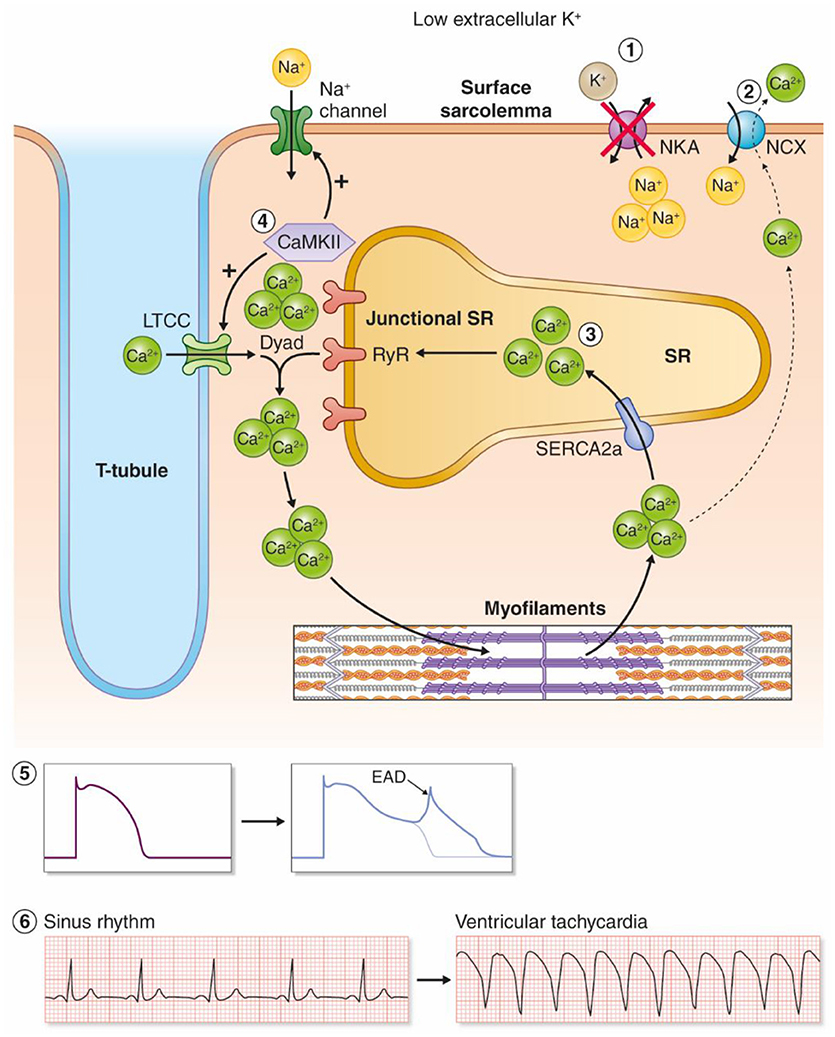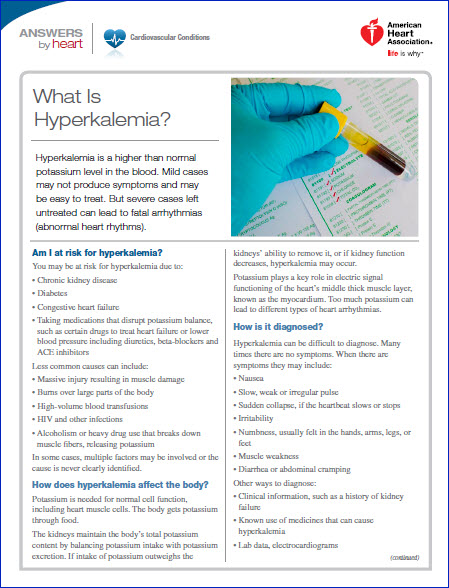A study finds that people with heart failure who also have abnormally high levels of potassium in the blood also known as hyperkalemia have a higher risk of heart failure readmission and death. Having too much potassium in your blood is known as hyperkalemia.

Hyperkalemia In Heart Failure Probably Not O K Journal Of The American Heart Association
Alterations in K regulation can lead to neuromuscular gastrointestinal and cardiac abnormalities.

Potassium and heart failure. Efforts to increase potassium intake are appropriate in certain populations who are vulnerable to cardiac arrhythmias such as patients with heart failure those taking digoxin and patients with a history of myocardial infarction or ischemic heart disease. Medications for heart failure may affect the level of potassium in your body. A normal consistent amount of potassium in the bloodstream can not only help your heart beat consistently but it can maintain heart strength and help prevent heart failure the inability of the heart to beat sufficiently to pump blood throughout the body.
This condition is more common in people with health conditions including congestive heart failure. To be updated on potassium physiology and pathophysiology in heart failure and on epidemiology of potassium imbalance To learn when and how to monitor and measure K levels in heart failure To learn how to evaluate management options in patients at risk of hyperkalaemia including new therapies that may improve patient adherence and treatment optimisation in patients with heart failure and high K. Previous studies have shown that increasing potassium intake can reduce the risk of cardiovascular diseases such as high blood pressure heart disease and stroke.
This includes helping your heart beat normally and regulating blood pressure. Some medications such as diuretics cause a loss of potassium. Both potassium K and magnesium Mg deficiencies are common and can be associated with risk factors and complications of heart failure HF.
The K content and distribution among the body compartments depend on a complex interplay of multiple factors including renal and gastrointestinal function. Potassium and sodium concentrations play a crucial role in electric signal functioning of the hearts middle thick muscle layer known as the myocardium. On the other hand angiotensin converting enzyme ACE inhibitors angiotensin receptor blockers ARBs and aldosterone antagonists increase potassium levels and you may need to decrease the potassium in your diet.
The normal level of plasma potassium is 38 51 mmoll. Potassium levels are often abnormal in patients with heart failure HF and have a detrimental effect on clinical outcome. Medications for heart failure may affect the level of potassium in your body.
Derangements of potassium regulation often lead to neuromuscular gastrointestinal and cardiac rhythm abnormalities. We evaluated potassium levels in a real-world cohort of patients with HF and its effect on mortality. Other medications such as angiotensin converting enzyme ACE inhibitors angiotensin receptor blockers ARBs and angiotensin receptor-neprilysin inhibitors ARNi increase potassium levels.
However the mechanism is not known. Potassium homeostasis is important for normal cellular function and is regulated by ion-exchange pumps primarily cellular membrane-bound sodium-potassium ATPase pumps. Diet medications and supplements.
When the serum potassium level is below 35 mmol potassium supplementation may be warranted even in asymptomatic patients with. Potassium K is the most abundant cation in humans and is essential for normal cellular function. Some diuretics cause loss of potassium and so we may encourage high dietary potassium intake.
One explanation is that potassium might prevent vascular calcification the buildup of calcium in the smooth muscle cells within arteries. The following are key points to remember from a state-of-the-art review on abnormalities of potassium K in heart failure HF patients. Congestive heart failure CHF is becoming more frequent worldwide.
The study which was published in the European Journal of Internal Medicine looked at whether hyperkalemia at admission predicts one-year outcomes in elderly patients admitted. Potassium is a mineral that has many roles within your body. An above normal level of potassium can interfere with proper electric signals in that muscle layer and lead to different types of heart arrhythmias.
Some medication can increase your potassium level. Sometimes the low levels cause the heart to pump blood ineffectively in a condition known as heart failure. Potassium levels can be low without being so low that the heart stops contracting.
Hyperkalemia especially with potassium levels 55 mmolL has been consistently linked to poor clinical outcomes in patients with HF. In heart failure patients because it can cause cardiac conduction disorders such as cardiac arrhythmias This study aims to monitor levels of potassium in the use of combination therapy with furosemide captopril in heart failure patients. 3 4 Recent estimates from the PARADIGMHF Prospective Comparison of ARNI With ACEI to Determine Impact on Global Mortality and Morbidity in Heart Failure trial suggest the incidence of hyperkalemia in a.
High or low potassium levels in your blood can affect your heartbeat. Cumulative incidence curves for first occurrence of potassium 50 mmolL potassium 55 mmolL or potassium 60 mmolL in patients with first hospital diagnosed heart failure according to estimated glomerular filtration rate eGFR category.

The Meaning Of Hypokalemia In Heart Failure International Journal Of Cardiology

Pathophysiology Of High Potassium Concentration In Heart Failure Download Scientific Diagram

Abnormalities Of Potassium In Heart Failure Jacc State Of The Art Review Sciencedirect

Frontiers Hypokalemia Induced Arrhythmias And Heart Failure New Insights And Implications For Therapy Physiology

Hyperkalemia High Potassium American Heart Association